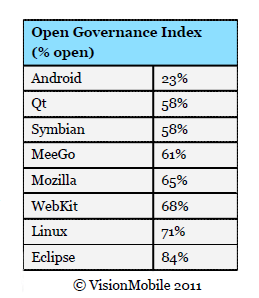A research performed by VisionMobile Market firm on 8 top open source projects including Android, MeeGo, Linux, Qt, WebKit, Mozilla, Eclipse and Symbian. The Open Governance Index quantifies a project’s openness, in terms of transparency, decisionmaking,
reuse and community structure. The research paper is free to download here.
http://www.visionmobile.com/rsc/researchreports/Open%20Governance%20Index%20(VisionMobile).pdf
The research index comprises of thirteen metrics based on the openness of the projects in the following category:-
- Access: availability of the latest source code, developer support mechanisms, public roadmap, and transparency of decision-making
- Development: the ability of developers to influence the content and direction of the project
- Derivatives: the ability for developers to create and distribute derivatives of the source code in the form of spinoff projects, handsets or applications.
- Community: a community structure that does not
The research also points out the importance of the open source movement and how it has revolutionized the technology industry. It suggests that it would cost around $1.4billion to create the Linux kernel itself; around $10.8 billion to build the Fedora 9 Linux OS2, and around $89m to create the WebKit browser engine.
The research states that with Android being one of the most successful open source project, it is also the most closed project accumulating just 23% in the Open Governance Index. The research also points out that the Android was made available by Google just to enable mobile handset makers to make cheap wireless handsets so that they can drive ads to the users.
So why did Android rank so low in the openness rankings, Its all because of the closed mentality of Google to govern the development of the Android platform. The Access of the public to the Android roadmap is very limited. The Android roadmap is controlled by Google with little input from external parties or the Open Handset Alliance. And in March,2011, Google announced that they will not be providing with the latest source code to Android(Honeycomb) saying they have more work to do before they make the source code public.
On the Development of Android very few external contributions are committed to the Android codebase and the larger part is just Google itself. And all the contributions are approved by the employees of Google. There is also no statistics on how many contributions are made by non-Google employee nor how many are accepted and implemented on the Android platform.
On the ability of creating Derivatives , Google tightly controls the Android platforms and the device manufacturers must pass the Compatibility Definition Document(CDD) and Compatibility Test Suite(CTS) in order to use Android trademark and other Google Mobile Services in their devices. And those who fail to pass these test cannot claim to be Android devices and access the Android Market.
On Community structure research on Android, when android was launched OHA served the purpose of public industry endorsement for Android, but now OHA serves little purpose to the cause.
Android has been a great successful in the open source projects but if Google really wants to show Android as an Open Source Software, they will have to show more openness and freedom in the access, development, derivatives and community structure of the project.
